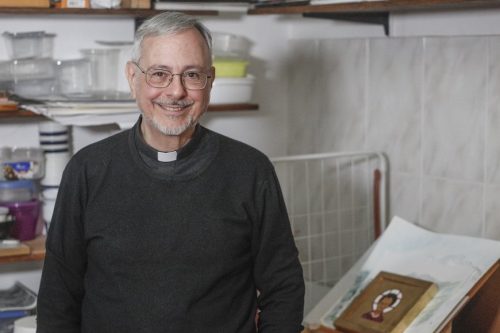By Robert Duncan | Catholic News Service
ISERNIA, Italy (CNS) — After being shot by gangsters, Jeremiah Kelechi fled his home in Nigeria, traversed the Sahara, dodged battling militias in Libya and boarded a small, precarious boat bound for Europe.
It was only when he met Father Francis Tiso, a U.S.-born priest living in Italy, that he believed he could survive the new challenges he faced in the country he now called home.
“I always tell him that, ‘You are more than my father,’ you know. Even my birth father cannot fight for me like this,” Kelechi said.
httpv://youtu.be/wSOsdbKc1Kg Kelechi is one of scores of young migrants Father Tiso has helped make a new life in Italy when the government-sponsored system for integrating migrants has failed.
“We’ve got a good number of people who fell through the cracks, who didn’t finish their language certificate, who didn’t really find jobs easily,” Father Tiso said. As a result, they have numerous health, administrative and legal problems that can’t be easily solved in the Italian system.
With funds raised primarily from U.S. donors, Father Tiso provides “direct assistance to the immediate, recognizable needs of migrants, very often at the category of the most desperate,” he told Catholic News Service in early December.
“Who is going to pay for the bed and breakfast when you go looking for a job out of town? We do that. Who is going to pay for that first payment on an apartment — if you are lucky enough to find one? We do that,” Father Tiso said.

Father Tiso also shares his home in the Molise mountains with migrants who need a place to live while they seek work and runs another home for migrants 15 miles away.
“Saint Basil the Great said that every Christian family should have a room for the homeless,” Father Tiso said. “And so, my library, which is chock full of (books on) theology and world religions, is also a guest room.”
Father Tiso, 72, says he lives a mostly contemplative life in Isernia, about 100 miles southeast of Rome. When he’s not producing herbal extracts and medicines from plants in his garden, painting icons and other art, or translating works from Tibetan to English, he uses his garage as a workshop where the migrants he helps can learn marketable trades.
Back in the 1980s, when Father Tiso was seeking a religious community that could accommodate his interreligious and eremitic longings, he was introduced to Msgr. Ettore Di Filippo, a like-minded cleric who was working at the Vatican mission to the United Nations.
When Msgr. Di Filippo was later made bishop of Isernia, he invited Father Tiso to be ordained in his diocese to live out his unique calling.
“The diocese is happy that I can speak English and even some French,” Father Tiso said, “(I) can relate as an anthropologist to people coming from different cultures.”
“I can do the counseling work and the translating work that is needed by the migrants to help them insert themselves into European society,” Father Tiso said.

However, Father Tiso explained, modern European culture can shock the migrants, who often come from devout Christian or Muslim communities.
At the start of the migration crisis, “we were talking together, Muslims and Christians, about this exodus process being a message of hope and faith that would actually help Europe recover its roots, its spiritual roots, and I continue to hold a fragile hope for that,” he said.
Working with migrants like Kelechi, Father Tiso said, has reminded him how important faith is to the political and social survival of Europe.
“These are people of faith, and they find the European secularization process deeply disturbing,” the priest said. “They feel that they have moved from a culture of violence that was dominated by lawlessness into a society that does have law, does have order, but doesn’t have a heart.”
“I think the migrants have much to teach us about what it means to be able to say, ‘I got to these shores for one reason alone, that God was on my side, that God was with me,'” Father Tiso said.
Kelechi is one of hundreds of thousands who have made the perilous voyage from North Africa to Italy by boat since 2014, when political upheavals in Libya made migrant smuggling a steady enterprise. He said that the hardest part of his journey is knowing that so many who had helped him survive it did not.
“Most of them who really helped me,” he said, “I heard they died in the sea.”






















